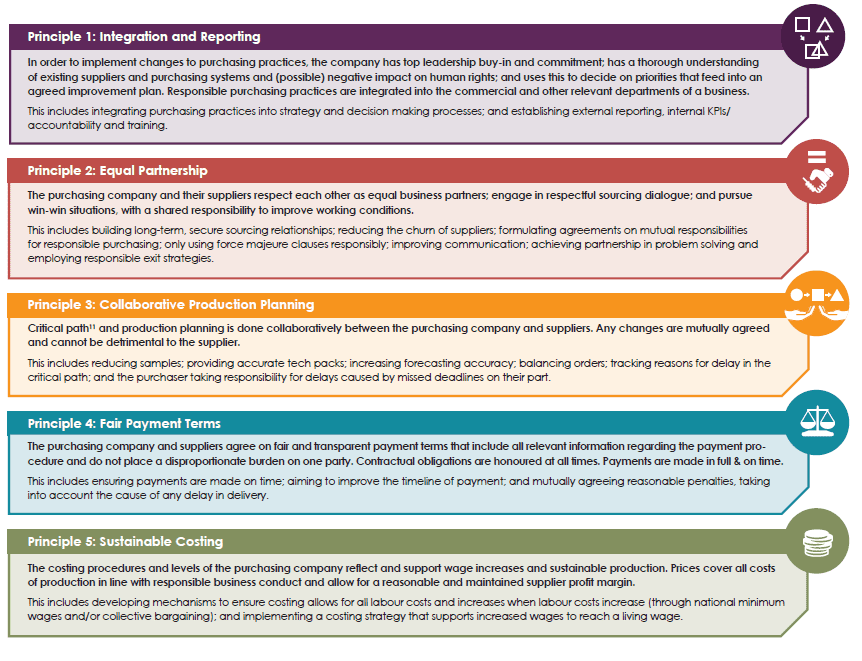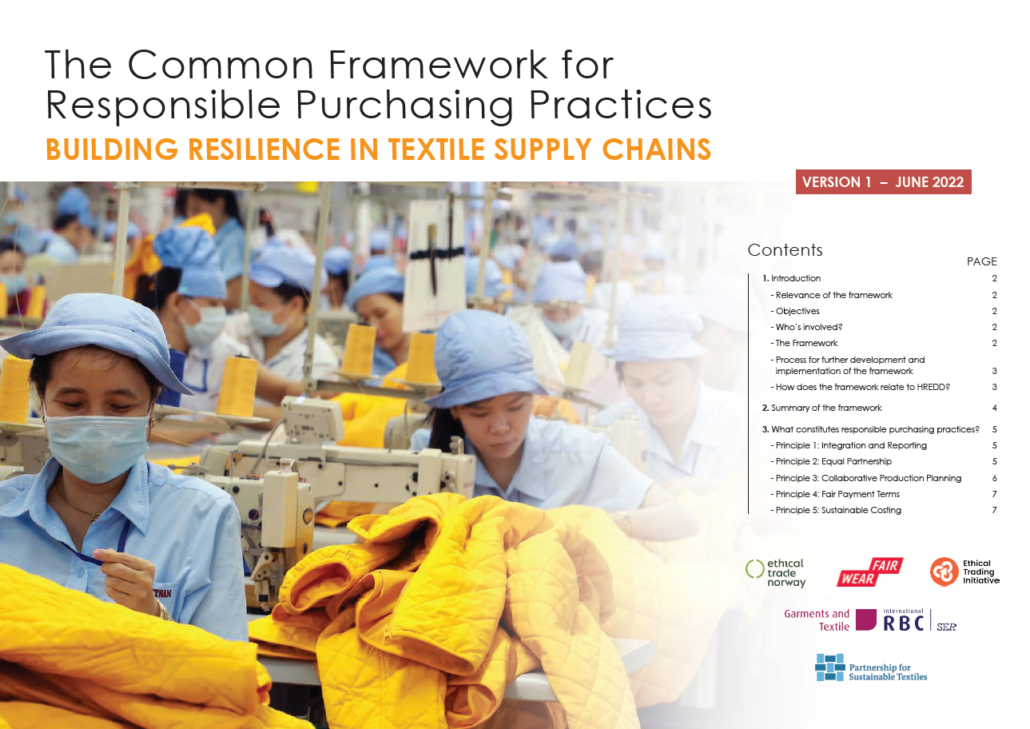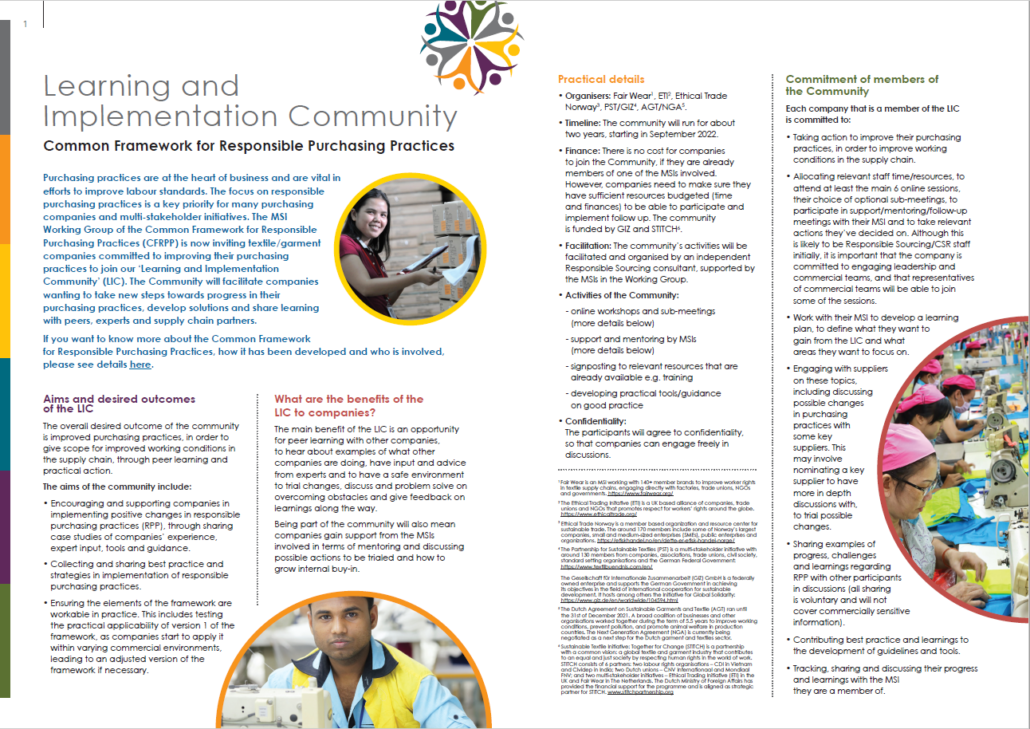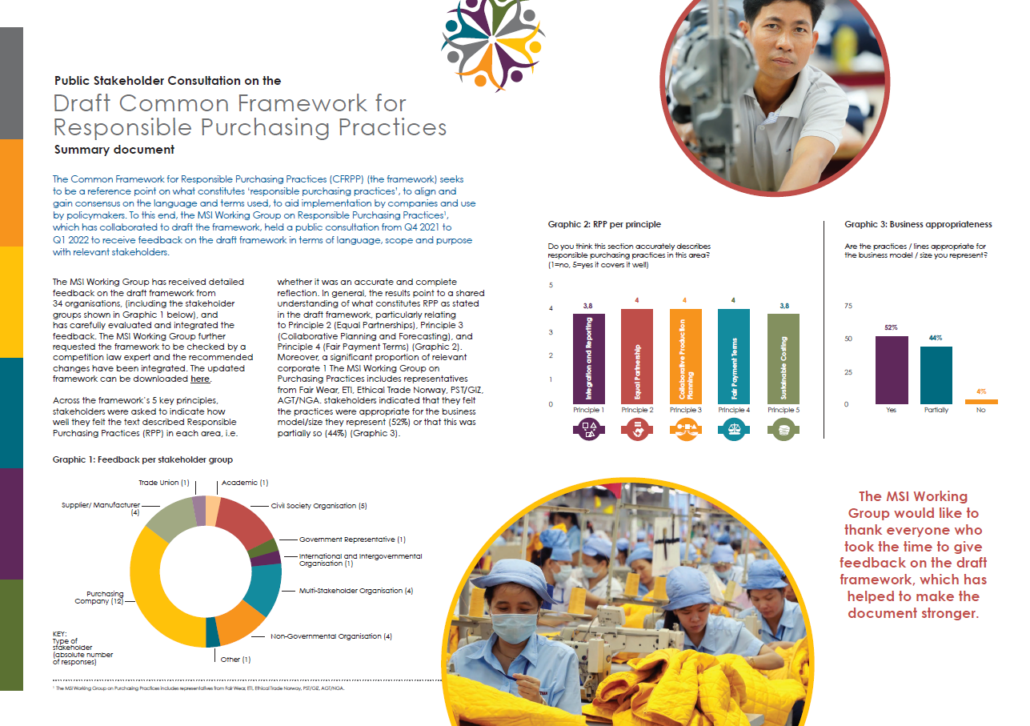CFRPP: A Reference Document for Responsible Purchasing Practices
CFRPP: A Reference Document for Responsible Purchasing Practices
Companies have a duty to conduct human rights due diligence for their international activities and revising their purchasing practices is an important element of this. They have the potential to support and enable improved working conditions, the implementation of living wages and better planning and business sustainability among suppliers.
The goal of the framework is to serve as a joint reference point for companies working to improve their purchasing practices and for multi-stakeholder initiatives (MSI) supporting their member companies in implementing practical improvements in purchasing, to increase the scope for improved working conditions in supply chains. The framework is the result of a 2-year process between a group of MSIs. These include the Ethical Trading Initiative, Ethical Trade Norway and Denmark, Fair Wear, the Partnership for Sustainable Textiles and the Dutch Agreement for Sustainable Garments (AGT). The Working Group also consulted with ACT (Action Collaboration Transformation), Better Buying Institute, Better Work and amfori.
The framework recognises and emphasises that the responsibility to respect human rights and environmental standards in textile supply chains cannot be placed solely on suppliers, but that purchasing companies must also take responsibility. Action needs to be taken by purchasing companies to amend their purchasing practices, where these undermine good working conditions.
Companies are now building a "Learning and Implementation Community" to use the CFRPP and the support of the MSI to learn from and with each other on how to improve their purchasing practices.
Studies by the International Labour Organisationthe Better Buying Institute and the Joint Ethical Trading Initiatives have demonstrated: poor purchasing practices by some brands and retailers have contributed to and even driven human rights issues in supply chains. This trend prevails even where issues such as low wages and long working hours are prohibited in those same companies’ own human rights policies and standards.
Late sign off and changes in product requirements or volumes can result in long working hours for workers and increased use of temporary workers and subcontracting. Only 17% of suppliers responding to an ILO survey said that their orders had long enough lead times. Over half (52%) of textile clothing suppliers said that they accepted prices lower than their production costs and a third of these said this made it difficult to pay workers’ wages and also had an impact on business sustainability. Long payment terms of more than two months also means that suppliers are holding the financial risk and this can make their businesses vulnerable.
This Working Group released the draft framework (CFRPP), in November 2021 to discuss with stakeholders, based on a benchmarking exercise of a wide range of documents on the topic. The Working Group has now finalised the document, after evaluating and incorporating feedback from a wide range of stakeholders. 34 organisations actively contributed with detailed suggestions and proposals. A document has been shared with the updated framework, to summarise the feedback given and how it has been integrated.
„Das Common Framework ist ein wichtiger Schritt zu verantwortungsvollen Einkaufspraktiken. Wir erhoffen uns davon, dass Unternehmen dem Thema mehr Aufmerksamkeit schenken und notwendige Veränderungen ihrer Einkaufspraktiken einleiten. Die Multi-Stakeholder-Initiativen in der Arbeitsgruppen, zu der auch das Textilbündnis gehört, wollen ihre Mitglieder unterstützen, gemeinsam Fortschritte erzielen und die Bemühungen so weit wie möglich aufeinander abstimmen,“ says the head of the Partnership Secretariat, Jürgen Janssen.
The framework groups different aspects of RPP into five Principles:

Moving forward, the MSI Working Group on Purchasing Practices is mobilising companies committed to taking new actions to improve their purchasing practices. A group of these companies will join a peer-learning environment for two years from September 2022, called the ‘Learning and Implementation Community’ (LIC). Clothing retailers and brands from a wide range of countries including Belgium, Germany, the Netherlands, Norway and the UK, will be involved in a series of online interactive workshops, which will include discussions and problem solving with suppliers on particular topics. The LIC will be developing resources including guidelines, case studies, tools and video resources that will be shared more widely so that other companies and stakeholders can benefit from the learning of the community.
Background information
The goal of the framework is to serve as a joint reference point for companies working to improve their purchasing practices and for multi-stakeholder initiatives (MSI) supporting their member companies in implementing practical improvements in purchasing, to increase the scope for improved working conditions in supply chains. The framework is the result of a 2-year process between a group of MSIs:




![]()
The framework is based on a benchmarking of existing documents and standards of the involved MSIs and others that have published recommendations on responsible purchasing. It also integrates key elements from the recent Whitepaper by the Sustainable Terms of Trade Initiative (STTI). The MSI Working Group is working closely with the Sustainable Terms of Trade Initiative to ensure that suppliers are part of these discussions, which is essential as steps are taken towards a fairer balance in buyer-supplier relations.
The LIC is funded by the Initiative for Global Solidarity (IGS) implemented by Deutsche Gesellschaft für Internationale Zusammenarbeit (GIZ) GmbH (supported by the German Federal Ministry for Economic Cooperation and Development) and the Sustainable Textile Initiative: Together for Change (STITCH) (supported by the Dutch Government).





